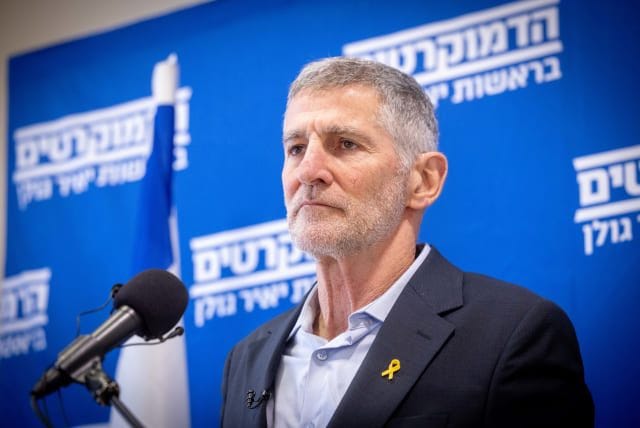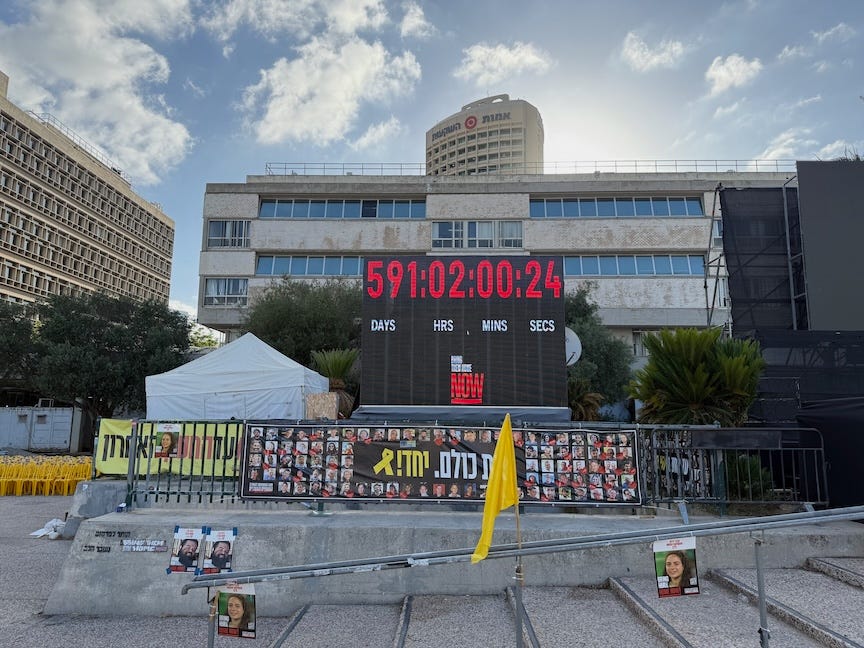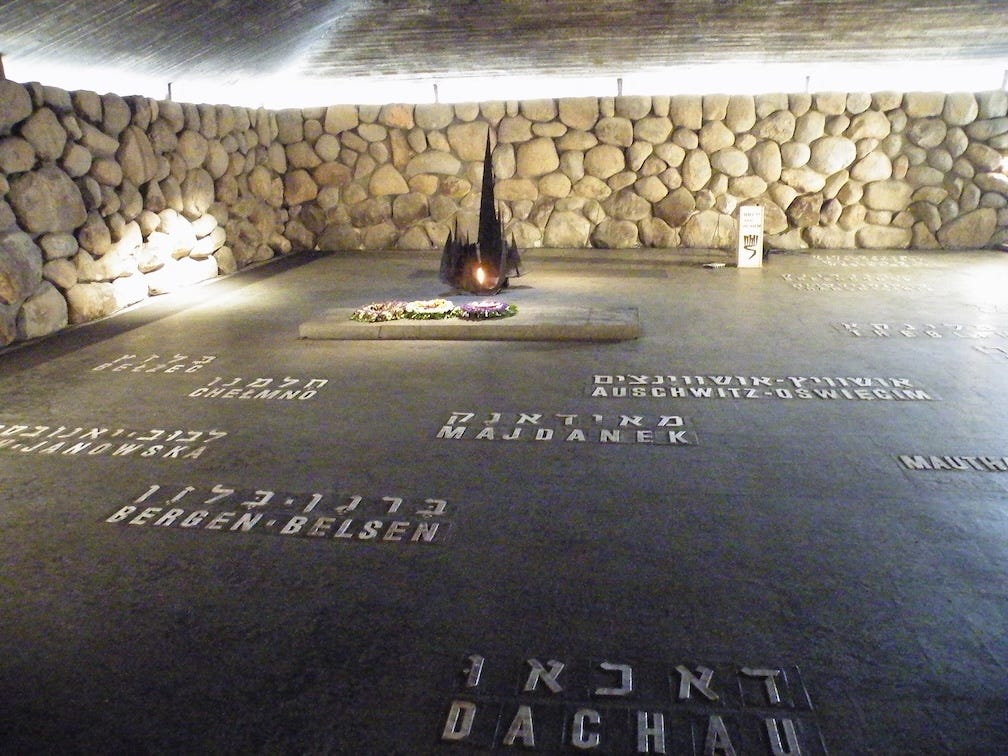DAY 592 OF THE WAR: Yair Golan Sparks Political Uproar; More Israelis Charged with Spying 4 Iran, Ceasefire Negotiations Stall; Global Criticism of Israel’s Renewed Gaza Offensive Mount
Tel Aviv Diary, May 20, 2025
For the second time in a week, Israeli authorities have announced charges against young Israelis accused of spying for Iran. Late last week, an 18-year-old from Yavneh was indicted for allegedly surveilling the hospital where former Prime Minister Naftali Bennett was receiving treatment. Today, two students from Nesher—one of them enrolled at the Technion—were charged with installing surveillance cameras on behalf of the Iranian operatives.
According to reports, both were burdened by significant gambling debts, and were allegedly promised financial compensation by their Iranian handlers. Since the start of the war, nearly 20 espionage cases involving Israeli citizens acting on behalf of Iran have been uncovered—marking a disturbing trend: Jews spying for a hostile foreign power, not out of ideology, but for money.
GOLAN UNDER FIRE FOR GAZA REMARKS
This morning, Yair Golan, head of the Democratic Party and former Deputy IDF Chief of Staff, issued a controversial statement warning that Israel is in danger of becoming a pariah state. Golan went further, claiming that Israel was “killing babies as a hobby” in Gaza. His remarks drew widespread condemnation across the political spectrum, with the harshest criticism coming from opposition politicians—none of whom wanted to appear less supportive of the IDF.
There is no question that Golan’s choice of words was both unfortunate and inappropriate. No one seriously believes that killing babies is anyone’s “hobby,” and it remains unclear if that was his intended meaning when he used the Hebrew word “chovev”. Perhaps he meant to say that we are killing babies without sufficient thought or moral reckoning—a deeply painful truth that most Israelis would rather not confront.
We were all raised to believe that the IDF is the most moral army in the world. That may never have been entirely true in practice. In my view, it is nearly impossible to maintain a completely moral military while maintaining a prolonged occupation. An occupying force, by its very nature, denies equal rights to under its control, and, over time, often comes to see them as undeserving of those rights.
In the wake of the October 7th massacres, a potent mix of grief, rage, and the widespread belief that all Gazans supported Hamas created an atmosphere in which actions were taken that should never have been. In some circles, Palestinians have even been equated with Amalek—the biblical enemy the Torah commands to utterly destroy.
Israel’s deepening moral crisis first came into public view during the case of Elor Azaria, the soldier who fatally shot a severely wounded Palestinian attacker who no longer posed a threat. While the killing itself constituted a serious breach of military ethics, an even more troubling sign was the way Azaria was embraced as a hero by segments of the Israeli right.
Fast forward to today, and the problem has only intensified. To be clear, the IDF is almost certainly operating with more restraint than the U.S. military did in Iraq or Afghanistan. But unlike the Americans, Israel cannot simply withdraw. The families whose lives may have been shattered will remain our neighbors for generations. That reality makes moral conduct not only a question of principle, but of long-term security.
Yet rather than confront these difficult questions, Israel’s political leadership—from Gantz to Lapid, Netanyahu to Herzog—has focused almost exclusively on condemning Yair Golan. One of the few former officials to publicly defend him was former Prime Minister Ehud Barak, who stated:
Yair Golan is a brave and direct man—an “offensive-minded” person. If I had to go out on a raid tonight or embark on a tough political journey tomorrow, I would rather have him by my side than any of his recent critics and detractors. Even if he could have chosen one or two different words, it’s clear his remarks were aimed at the political leadership, not the soldiers. And as with the “processes” precedent—he was right then, too!
This evening, Yair Golan held a press conference in which he described the backlash against him as part of the government’s “poison machine.” He asserted that while the war had initially been a just response, it now lacks a clear objective. Golan clarified that his criticism was directed at the government—not at the IDF. He emphasized that a government willing to abandon the hostages and continue killing civilians without a defined strategy does not deserve the public’s support.
When asked during the Q&A session whether his remarks meant he was calling on reservists to refuse service, Golan responded firmly: “Absolutely not. Military service must remain above political divisions.”
As Israel intensifies its military operations in Gaza, diplomatic fallout begins to surface. The United Kingdom announced it is suspending negotiations with Israel on a potential free trade agreement; while France has signaled it will soon impose sanctions. These developments marks the beginning of a diplomatic tsunami long feared by Israeli officials.
The resumption of fighting without a clearly articulated endgame, the refusal to pursue a path toward resolution, and the continued civilian suffering in Gaza have created ideal conditions for growing European condemnation.
The rift between Washington and Europe since Trump’s return to the White House, has limited the ability of the U.S. to moderate Europe’s actions against Israel. Regrettably, while many Israelis may be tempted to dismiss the criticism as antisemitism, the mounting international pressure demands serious attention and reflection.
GAZA
Israel today permitted 93 trucks carrying food and other humanitarian aid into Gaza. The Prime Minister’s Office acknowledged that there is no way to fully prevent the aid from reaching Hamas, but allowed the transfer to proceed nonetheless. It was reported that ten trucks were hijacked soon after they entered Gaza. The UN claimed that no trucks reached their destinations.
Meanwhile, negotiations in Doha appear to have reached a dead end. While official Israeli sources are expected to place the blame on Hamas, the deeper impasse lies in Israel’s refusal to accept any agreement that requires an end to the war. This, at its core, is the central obstacle. Prime Minister Benjamin Netanyahu has made it clear he will not agree to a ceasefire unless Hamas effectively surrenders—an outcome that remains far from reach. Nevertheless, tonight Netanyahu ordered the senior negotiators to return to Israel, leaving behind a few experts.
In a separate, strange development, Likud Knesset Member Tali Gottlieb drew criticism after claiming that released hostages had been “brainwashed” by Hamas—apparently in response to some former captives voicing criticism of the government.
TRAVEL NEWS
At Ben Gurion Airport, the day brough a mix of good and bad news. On the positive side, Delta Airlines has resumed flights to Israel, reintroducing long-awaited competition on the New York route. While I would still choose El Al without hesitation (a preferred choice for many), the return of international carriers signals cautious optimism—provided the Houthis do not disrupt progress. On the downside, Lufthansa and its affiliated carriers have once again postponed their return to Israel, and Air France has announced another delay, reflecting continued concerns over regional instability.
BUSINESS
Elbit Systems
Robust Q1 2025 Earnings Amid Rising Global Defense Demand
Haifa-based defense technology leader Elbit Systems reported strong financial results for the first quarter of 2025, buoyed by escalating global defense spending and solid international demand for its advanced military systems. Revenues surged 22% year-over-year to $1.9 billion, marking the fourth consecutive quarter of double-digit growth in both revenue and earnings. GAAP net income attributable to shareholders rose to $107.1 million, a 45% increase from $73.7 million in the same quarter last year, while diluted earnings per share climbed to $2.35 from $1.65.
President and CEO Bezhalel (Butzi) Machlis credited the sustained growth to heightened global defense budgets, particularly in Europe, where Elbit maintains a significant footprint through its subsidiaries. “Our backlog now exceeds $23 billion, up 14% from a year ago,” Machlis noted, adding that $161 million in free cash flow was generated in the quarter. To meet growing demand, Elbit is ramping up production capacity and optimizing its supply chains. Approximately two-thirds of the current backlog stems from international orders, with over half slated for fulfillment by the end of 2026.
Segment-wise, the company saw significant growth across key areas: Land systems revenue jumped 48% due to strong sales of ammunition and munitions, while Aerospace revenues rose 20% driven by increased sales of precision-guided munitions in Israel and Asia Pacific. Revenues from Elbit Systems of America rose 18% on the back of higher sales of soldier systems and medical instrumentation. C4I and Cyber revenues increased 12%, with ISTAR and electronic warfare revenues up 4%, reflecting continued demand from both domestic and European clients.
Operating income for the quarter reached $149.7 million under GAAP, a rise from $105.4 million in Q1 2024. On a non-GAAP basis, net income reached $117.2 million, with earnings per share of $2.57. The company also reversed its cash flow position, generating $183.6 million in cash from operations compared to an outflow in the same period last year. With an expanding backlog, solid revenue momentum, and investment in scaling operations, Elbit Systems appears well positioned to capitalize on a shifting global security landscape.
Bank Leumi
Strong Q1 2025 Results, Driven by Credit Growth and Resilient Loan Quality
Bank Leumi reported a net profit of approximately NIS 2.4 billion for the first quarter of 2025, up from NIS 2.1 billion in the same quarter last year. Return on equity for the quarter stood at 15.4%, slightly down from 15.6% in Q1 2024. The bank announced a dividend of NIS 961 million for the quarter, of which NIS 721 million will be paid in cash and the remainder via a share buyback—together representing around 40% of the quarter’s net profit.
The bank continues to see solid growth in its strategic credit portfolios, with total credit to the public expanding by 1.6% during the quarter. Business lending, including real estate, rose 4.2%, commercial lending increased by 0.8%, and the mortgage portfolio grew by 1.2%. As of the end of March 2025, net credit to the public reached NIS 462.8 billion, up 8% year-over-year. Mortgage lending alone climbed 10.4% over the same period to NIS 148.3 billion.
Loan quality indicators remained robust, with non-performing loan (NPL) and problematic debt ratios at just 0.51% and 1.39%, respectively. Problematic debt declined by NIS 157 million since the beginning of the year. Credit loss expenses were minimal at just 0.05% of the average public credit balance, compared to 0.21% in Q1 2024—most of it being collective provisions partially offset by recovery income.
Despite signs of stabilization, the bank noted that its credit loss provisions still reflect ongoing economic and geopolitical uncertainty. The lingering impact of the October 2023 war remains, with Leumi estimating the total cost of war-related support and donations at NIS 428 million. On the deposit side, public deposits rose marginally to NIS 596.4 billion, with noticeable increases in private (up 2.1%) and small business deposits (up 4.6%).
ISRAELTECH INTERVIEW: Defense Tech Is Israel’s Future – Like It or Not
As part of our ongoing partnership with IsraelTech, this week’s featured interview is with Lital Leshem of Protego Ventures.
Can a startup save a country? Or is defense tech the only real path to peace? Lital Leshem, the battlefield-tested investor is reshaping Israel’s defense tech future. From Gaza to global VC, Lital is now leading a $150M fund investing in unmanned systems, AI, sensors, and satellite comms — and she’s not shy about what’s broken in our defense ecosystem or who’s to blame.
In this punchy, no-holds-barred sit-down with Yoel Israel, Lital talks about:
Why Europe’s defense panic is Israel’s moment to lead
What went wrong on October 7th - and how we fix it
How she’s turning Iron Dome innovators into global unicorns
Plus: The controversial reason she says world peace could kill her fund…
Watch the preview below. Click here to view the full interview.
∞–––––∞–––––∞–––––∞–––––∞–––––∞–––––∞–––––∞–––––∞–––––∞
TRAVEL ACROSS ISRAEL
Jerusalem—Day 6
From Mt Herzl, we will continue to nearby Yad Vashem, Israel’s official memorial to the victims of the Holocaust. A visit to Yad Vashem, Israel’s official memorial to the victims of the Holocaust, is a profoundly moving and thoughtfully curated journey through one of the darkest chapters in human history. Located on the western slope of Mount Herzl in Jerusalem, the sprawling complex weaves together history, remembrance, and education.
The heart of the experience is the Holocaust History Museum, a striking triangular concrete structure, symbolizing the rupture in civilization caused by the Holocaust. The museum guides visitors chronologically through the rise of Nazism and the devastation of European Jewry, using a powerful array of photographs, artifacts, personal testimonies, and multimedia installations. Each gallery—focusing on ghettos, concentration camps, acts of resistance, and eventual liberation—constructs a chilling yet vital narrative, leaving visitors with a deeper understanding of the human cost and enduring legacy of the Holocaust.
One of the most powerful spaces within the museum is the Hall of Names, a solemn, circular chamber dedicated to preserving the identities of Holocaust victims. The walls are lined with binders containing Pages of Testimony submitted by survivors and their families, each one recording a name, a story, a life lost. Overhead, a haunting conical ceiling displays photographs of the victims, their faces gazing out in silent witness. Below, a dark well descends into the earth, symbolizing the millions whose names remain unknown.
Nearby, the Museum of Holocaust Art offers a deeply personal perspective on suffering and survival. It showcases works created by victims during or after the war—many of them in secret. These drawings and paintings offer glimpses into the inner worlds of artists who endured the unimaginable horror, capturing moments of spiritual defiance, grief, and fleeting hope amid the darkness.
Beyond the museum, Yad Vashem’s memorial grounds offer several deeply moving spaces for reflection.Among them is the Children’s Memorial, a haunting tribute to the 1.5 million Jewish children murdered in the Holocaust. Carved into an underground cavern, the space is illuminated by a single flickering candle, its light endlessly reflected by a system of mirrors to create the illusion of an infinite constellation—each point of light symbolizing a young life extinguished. In the darkness, names, ages, and places of origin are recited in a continuous, mournful loop.
Other memorials include the Valley of the Communities, a massive outdoor monument hewn from the bedrock of the Jerusalem hills. It bears the names of more than 5,000 Jewish communities that were destroyed or irrevocably damaged during the Holocaust. Each name is etched into stone—a final act of remembrance, preserving the legacy of entire worlds that once were.
Our visit to Yad Vashem will conclude with a walk along the Avenue of the Righteous Among the Nations, a serene pathway lined with trees planted in honor of non-Jews who risked their lives to save Jews during the Holocaust. Each tree is accompanied by a plaque bearing the name of a rescuer, together forming a living memorial to human courage, compassion, and moral conviction in the face of unimaginable evil.
Yad Vashem is more than just a memorial—the institution is a moral compass, a place that calls on visitors to remember, to educate, and to uphold the responsibility of ensuring that such atrocities never happen again. A visit to Yad Vashem leaves few untouched, grounding the unfathomable scale of the Holocaust in personal stories and enduring ethical lessons that echo far beyond its walls.







Thank you for being brave enough to say this, and highlight the unavoidable rot caused by the continued occupation on the IDF:
We were all raised to believe that the IDF is the most moral army in the world. That may never have been entirely true in practice. In my view, it is nearly impossible to maintain a completely moral military while maintaining a prolonged occupation. An occupying force, by its very nature, denies equal rights to under its control, and, over time, often comes to see them as undeserving of those rights.
In the wake of the October 7th massacres, a potent mix of grief, rage, and the widespread belief that all Gazans supported Hamas created an atmosphere in which actions were taken that should never have been